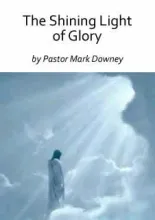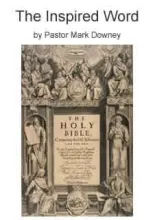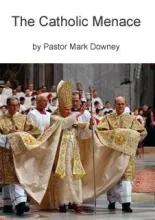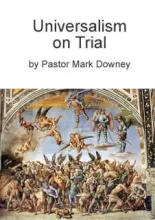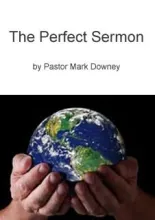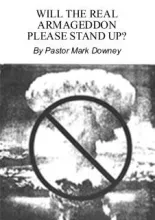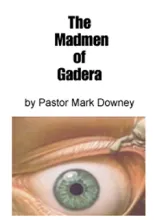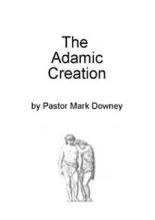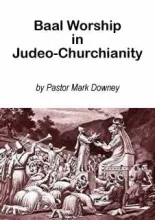Racial Issues of the Bible
Interview with Pastor Downey
I was recently given the opportunity to give a Christian Identity response to a bible college project on racism. Specifically, I addressed some of the comments made at the Kinsman Redeemer website. Many of the questions go directly to the core message of race in the Bible. Most of these students are probably hearing the focus of Identity for the first time. We therefore ask our friends in the Christian Identity community to pray that the planting of these seeds finds fertile ground and will grow with God's blessings.
Hello Pastor, I am a Wheaton College Student (Christian college in Illinois) working on a project for my class "Gospel, Church, and Culture." The project requires me to investigate the Christian response to racism. Although the "racism" of whites to blacks is constantly over-reported in the media, I know that the racism and persecution that we as members of the White race have to endure is far worse. I would love to hear your organization's perspective on this issue and was wondering if it would be possible to get an interview with someone in your organization. Thank you.
Biographical information:
Interviewer: What theological training have you received?
I was trained in the ways of the Lord from childhood in the Methodist church (Prov. 22:6). I can and have read the same theological curriculum as most seminary students and have accumulated a vast library over the last 3 decades. I not only read, but study Scripture with the help of concordances, lexicons and Bible dictionaries to "rightly divide the word of truth." In this day and age I consider a "home-schooled" Holy Spirit led education in theology (AKA sola scriptura) to be far superior to establishment institutions, which I believe have become apostate. None of the disciples or apostles were "theologically trained" as we understand ministerial positions today. The Christian Identity movement demands vociferous scholarship from within its own community and thus a mutual satiation of documentation.
Interviewer: When did you first become involved with the Klan?
My involvement began in 1994 under the leadership of Pastor Thom Robb, who succeeded David Duke as National Director of the Knights. I don't consider all Klans to be legitimate as its namesake is in the public domain and has been exploited for the purpose of negative propaganda. The Knights is a legal organization based on the moral standards of Christian living.
Interviewer: When did you first feel called to preach the Gospel in this unique way with the goal to reach only the white race?
My calling to pastorship was by default from a church reorganization via committee. Eventually, church responsibilities rested upon me to conduct weekly worship services, counseling for the spiritual needs of the congregation and providing research and written messages for various media formats. I believe my mission to reach the lost sheep of the house of Israel, i.e. the White race, is identical to the calling of the 1st century apostolic church.
Biblical Objections to Kinsman's Ministry:
Interviewer: In reading what Kinsman stands for, I see repeated references to the Old Testament but few in the New Testament, is there a particular reason for this?
It is not "Kinsman's Ministry", but rather Kinsman Redeemer Ministries. The concept of a Kinsman Redeemer is found in both the Old and New Testament in regards to the redemption of a particular racial group of people by a prophetic Messiah, i.e. Jesus Christ. The Bible does not contradict itself by making unilateral covenants with the same people and then reversing that theme later on. Indeed, the New Covenant specifies the same racial identity as made previously in the Old Testament. "Behold, the days come, saith the Lord, when I will make a new covenant with the house of Israel and with the house of Judah (not to be confused with contemporary jews). Not according to the covenant that I made with their fathers." Heb. 8:8-9.
The racial hegemony of the word "kinsman" as applied to the New Testament has been arbitrarily interpolated to mean multicultural diversity through the political correctness of theological universalism, which more closely resembles the religion of Baal worship and the modern machinations of Marxist communism. The apostate church has inculcated this theory of racial reconciliation or inclusionary redemption to the detriment of the covenantal requisites for whom Christ came to redeem exclusively. Christ said, "I am not sent but unto the lost sheep of the house of Israel" Mt. 15:24. If He meant otherwise, He would have said so. There is a plethora of racial overtones throughout the New Testament, however much of the racial message has been obfuscated by false interpretations in order to destroy Christianity and the White race.
Interviewer: How does your ministry reconcile its beliefs that the bible is an exclusive book of scripture with Christ's commandment to "Go therefore and make disciples of ALL the nations." (Matthew 28:19) Does this not explicitly tell us to share Gods word with EVERYONE regardless of race, nation or tribe?
In order to properly understand Mt. 28:19 and any other passage that uses the words "all", "every", whosoever" etc. we must first have a grasp of the context and a wholistic appreciation of God's intents and purposes without any presumptions that would not be in harmony with the rest of Scripture. If one presumes Mt. 28:19 is addressing "EVERYONE" (as if capitalizing every letter gives greater import), then it should easily be reconciled with Mt. 10:6, "Go not into the way of the Gentiles, and into any city of the Samaritans enter ye not; but go rather to the lost sheep of the house of Israel." Obviously, every race, nation or tribe implied by theological universalists does not harmonize with the clear commands of Mt. 10:6. In fact, such implications are a contradiction and therefore not credible interpretations. There are different words translated as "all", "every" etc. in both Hebrew and Greek, and so we need to investigate those that are misused to promote forms of universalism.
In the New Testament, the Greek word 'holos' is used as "the whole", whereas the more frequently used word 'pas' is used to indicate "a part" as being all of either a greater or a lesser part. It is the making of 'pas' to have the same meaning as 'holos' that causes the error. Where translators have so often translated 'pas' as "all", "every" or "whosoever", it means "all of that part", or "every one of that part", or "whosoever of that part". The word, "whosoever" is frequently translated from the word 'pas' that is also translated as "all". We can see that any untaught person who says, "Where my Bible says "whosoever will may come", it means any person of any race", that person is either untaught or is misled.
Interviewer: Your ministry's website states "The shame of these universalists, even the race traitors within Identity who teach that salvation and redemption is designed for all the races of the earth, is that they knowingly and willingly spiritualize the recipients of God's design. They include those for whom God never intended to receive these things which are holy. "Give not that which is holy unto the dogs" Mt 7:6." Taking this statement at face value then does Kinsman Redeemer ministries view members not of the white race as "dogs"?
Yes, and this is an idiomatic expression that proves the status of non-White people, just as the use of other animal names symbolize people, such as wolves, serpents and goats. Do you think the Bible is warning us to not cast literal pearls before literal swine? Of course not. But there is a racial context for the use of the word 'dogs'. Mark 7:24-29 and Mt. 15:21-28 are probably slightly different versions of the same story. This woman was of Canaan and thus not an Israelite, which would explain why Jesus ignored her at first. However, her humble acceptance of her racial status was the admission and reason for Jesus granting her plea. We again see 'dogs' in relationship to the Kingdom of God as being on the outside per Rev. 22:15, "For without are dogs.". Who then is holy and do these people have a racial significance? Scripture answers this adequately in many passages to wit: "I am the Lord your God, which have separated you from other people. And ye shall be holy unto Me" Lev. 20:24, 26; "But ye are a chosen generation, a royal priesthood, an holy nation, a peculiar people. Which in time past were not a people, but are a people of God" I Peter 2:9. This last comment refers racially and specifically to the Israelites in Hosea 2:23.
(Since the initial interview, I've given further consideration as to the identity of the aforementioned Canaanite woman. I found Christian Identity commentaries identifying the woman as both Israelite and non-Israelite. The following comments elaborate on the Israelite identification.) There are two possibilities for Mt. 15:21-28 and Mark 7:24-29, which are probably slightly different versions of the same story. The woman was residing in Canaan and either could have been an Israelite or a Canaanite. Her background as either a non-Israelite or an Israelite race mixer would explain why Jesus ignored her at first, which is why He declared exactly who He came to this earth for. However, her humble acceptance of her racial status was the admission and reason for Jesus granting her plea. This verse can be taken so many different ways, but it is a favorite of universalists to rationalize "salvation for all races". However, in doing so, they have to ignore that Jesus said He only came for the lost sheep of the house of Israel in the same narrative (and elsewhere). The usual presumption is that this woman was not an Israelite and that she was a Canaanite. However, there are other Israelite women in the Bible who were alluded to as Canaanites such as Tamar, Rahab and Ruth. The confusion arises from their geographical residence and not their race. Mark 7:24-29 relates the same story, but calls her a Greek (v.26). The most common Christian Identity interpretation of this story is that Jesus was preparing His own disciples in Galilee in order to go out into the gentile world and find the lost sheep, their racial kindred. If we accept that this woman was not White, then we can distort the rest of the Bible to conform to a universalist agenda as well.
There are two possibilities in regards to the Canaanite woman's daughter. She was a race mixer and her daughter was a dog or mamzer (as other NT scriptures refer to non-Israelites such as Mt. 7:6 and Rev. 22:15) or she was simply ahead of her time and acting like an insubordinate heathen i.e. a wigger. Jesus told Peter to 'feed My sheep' not 'feed my dogs'. The location of the encounter could be a precursor and anticipation for Paul's further explanation of the mission to the gentiles, meaning Israelites dispersed in the nations outside of Judea. At this point in time, Jesus had not yet trekked into gentile territory, but He was very close to it in this story. What's to be learned from this? That although the woman was a nuisance and out of line, her faith made up for it. Try picturing this scenario: a gentile woman approaches Jesus demanding He heal her literal four-legged puppy; of course Jesus has priorities on His mind about His own tribe in Judea, as she sarcastically calls Him "thou son of David" and the Lord refuses to grace her with a reaction; He didn't say a word to her, because He didn't care about her problems and then telling her his mission at the moment didn't include her; His primary purpose at that point in time did not involve her; but the woman was not stupid and mustered the courage to appeal for her dog. Even Christ could see the passion one had for an ailing pet and acquiesced. The moral of the story was that the disciples would learn that their long lost kin were not unclean animals, but brethren in need of salvation. That's what Christ was preparing them for. They would not go out into the world preaching the gospel until Christ died on the Cross. They certainly wouldn't be preaching salvation for all races. They successfully completed the Great Commission in the first century. It wasn't until more recent times that the leaven of universal salvation attempted a pathetic missionary crusade to non-Israelite nations, all of which was a dismal failure. Either way, the woman in this story does not give credence or justification to universal salvation.
Interviewer: I think that the biggest objection that many have to your ministry would be your statement that "God has always discriminated between the races. The Big Lie is 'God loves everybody'." How does Kinsman reconcile this belief with the fundamental verse of modern Christianity, John 3:16 "For God so loved THE WORLD that he gave his only begotten son and whoever believes in him shall not perish but have everlasting life."? Isn't a principle theme of the bible that Christ died for sinners and since all men are sinners Christ died for all men?
God said in Genesis that His Creation was good. It was good because all of Creation was biologically 'kind after kind'. However, God foreknew that His Creation would be corrupted and that mongrelization would pollute the world. This is why Jesus distinguished between the world in its original pristine state and the world of sin. He said, "Ye are of this world, I am not of this world" John 8:23. The Greek word for 'world' is 'kosmos' and means "orderly arrangement". Christ was contrasting the order of God and the order of man, known as worldliness. God certainly does not love worldliness. In fact, we are to deny ungodliness and worldly lusts for all that is in the world is explained in I John 2:16. Subsequently, "Sin is the transgression of the law" (I John 3:4). Why is this important racially? Because the law was only given to Israel, not all the other races of the earth. "He sheweth his word unto Jacob, his statutes and his judgments unto Israel. He hath not dealt so with any nation, and as for his judgments they have not known them" Ps. 147:19-20. Therefore, the principle theme of Scripture is not a universalist spin on John 3:16 as a mantra for multiculturalism and its accompanying conflict of laws alien to the Word of God as we see in the world today. The principle theme of the Bible is the destruction of worldliness or the Babylonian order and the restoration of Paradise or God's order of holiness/purity in 'kind after kind'.
Kinsman's thoughts on issues of race:
Interviewer: Based on your ministries view of the Gospel, what should the Christian response to racism be? Should it be an issue that merits the attention of Christians?
This is entirely dependent upon one's definition of the word 'racism'. I'm in accord with Webster's Seventh Collegiate Dictionary, which defines 'racism' as, "A belief that race is a primary determinant of human traits and capacities and that racial differences produce an inherent superiority of a particular race." On the other hand, there is the Orwellian newspeak definition of racism that is only applied to the White race in which racism is a generalization of a malicious criminal pathology with the intent to do harm to other races. The latter definition merits the attention of not only Christians, but anyone who is not that thrilled with the idea of living in a totalitarian society who can be charged with thought crimes. We have already started down the slippery slope of egalitarian legislation with the passage of hate crime laws.
Interviewer: Should members of the White race interact with and love members of other races as we are commanded to "love our neighbor"?
The biblical admonition to "Love thy neighbor" has absolutely nothing to do with the promotion of interracial relationships. Again, we must know what the Bible means by the use of certain words. Being that the Bible is about one race i.e. "This is the book of the generations of Adam" (Gen. 5:1), the context and connotation from words like neighbor, brother or families most often suggests those related by blood i.e. kindred or race. Deut. 7:6, Amos 3:2 and Ex. 19:5 should suffice to establish God's plan and purpose for racial order. The expression 'love thy neighbor' is not about who lives next door to you regardless of their race or a loftier platitude exuding the anti-Christian sentimentalities of the United Nations and the Hinduistic 'brotherhood of man'. 'Love thy neighbor as thyself' actually is exclusionary in nature rather than inclusionary. This is evidenced by Jesus' parable of the Good Samaritan in which the trick question was posed by a lawyer, "Who is my neighbor?" Jesus eliminated the priest, the Levite and the thief from being considered a neighbor. Therefore, the Lord does not command us to love all men. The point is that to be considered one of God's chosen people, the virtue of mercy is more important than merely being of a particular race. A neighbor obeys God's laws. It should also be noted that the word 'love' in these many passages is the Greek word 'agapao', which is the highest form of love in the sense of moral duty and Christian responsibilities. It should not be confused with 'phileo' or 'eros' love, which is mere affection or just liking something. "For this is the love of God, that we keep His commandments" I John 5:3. God's laws prohibit race mixing. Here is the conundrum for Christians today where miscegenation is epidemic. We are told in II Chron. 19:2, "Shouldest thou help the ungodly, and love them that hate the Lord?" No we shouldn't and the reason is given that "wrath [shall be] upon thee from the Lord." Is it just coincidence that the ungodly of the world are other races and that wrath is upon us because they may call themselves Christians, but in reality, bring their strange gods into the churches and thus reject Christ of the Bible? To those with eyes to see it is plainly seen that we are living in times where pious hypocrites call good evil and evil good.
Interviewer: Is racism against African Americans and other races even a big problem? Or is it racism against white culture the true problem?
You're asking the right question in a convoluted way. The reality is that there has been a culture war waged against the White race for decades. An even greater problem is the genocidal war of Black crimes against White people. Most White people would be shocked to hear about US Department of Justice survey of crime victims: more than 6 1/2 million violent crimes are committed each year (murder, rape, assault and robbery); 90% of the victims are White. Blacks thus committed 7.5 times more violent interracial crimes than Whites even though the Black population is only 1/7 the size of the White population. Adjusted on a per capita basis, they reveal an extraordinary disparity of Blacks committing 50 times the number of violent racial crimes against Whites. And not one has ever been prosecuted as a "hate crime". Is it a coincidence that these statistics began to skyrocket in the mid-1960's when schools were desegregated and the modern civil right movement took hold. More White people have died from this race war than soldiers in Vietnam while the antichrist controlled news media massages the race issue with propaganda and memory holes. There have been 170 million crimes against White people spanning a 30 year period. These crime figures are from 1995 and the problem has gotten worse not better as non-White Mexicans flood into this country bringing their crime wave as well. Ironically, anti-racism feeds its own agenda in the reverse by practicing racism vicariously by adopting the cause of every race except their own. The non-Whites have become the head and the Whites have become the tail just as the Bible predicts when His people disobey the laws of separation.
Interviewer: Is the Klan a Christian organization?
Yes, and more specifically it is not judeo-Christian which has caused so much turmoil and corruption. Moreover, the Klan i.e. the Knights is politically motivated to bring forth the Kingdom of God on earth as it is in heaven. However, there are some bogus Klans that include pagans, atheists and agnostics.
In His Service,
Pastor Mark Downey
- Log in to post comments

 "For thou art an holy people unto the Lord thy God: the Lord thy God hath chosen thee to be a special people unto himself, above all people that are upon the face of the earth."Deuteronomy 7:6
"For thou art an holy people unto the Lord thy God: the Lord thy God hath chosen thee to be a special people unto himself, above all people that are upon the face of the earth."Deuteronomy 7:6